Family Centred Care: Application of Qualitative Research in Healthcare
VerifiedAdded on 2022/12/14
|12
|3142
|373
Report
AI Summary
This report examines family-centred care, its definition, and its importance in healthcare, particularly in the context of Type 1 diabetes. It discusses the pathophysiology and symptoms of Type 1 diabetes, highlighting the significance of family support in patient well-being. The report analyzes a case study involving Haley Stephenson, emphasizing the application of qualitative research methods to understand the impact of family-centred care. It explores the methods, ethics, results, and limitations of the study, focusing on positive and negative perceptions of family-centred care and the role of nurses and healthcare professionals. The findings underscore the importance of emotional support, parental involvement, and culturally sensitive care models in enhancing patient outcomes. The report concludes with recommendations for further research and policy improvements to promote family-centred care in healthcare settings.
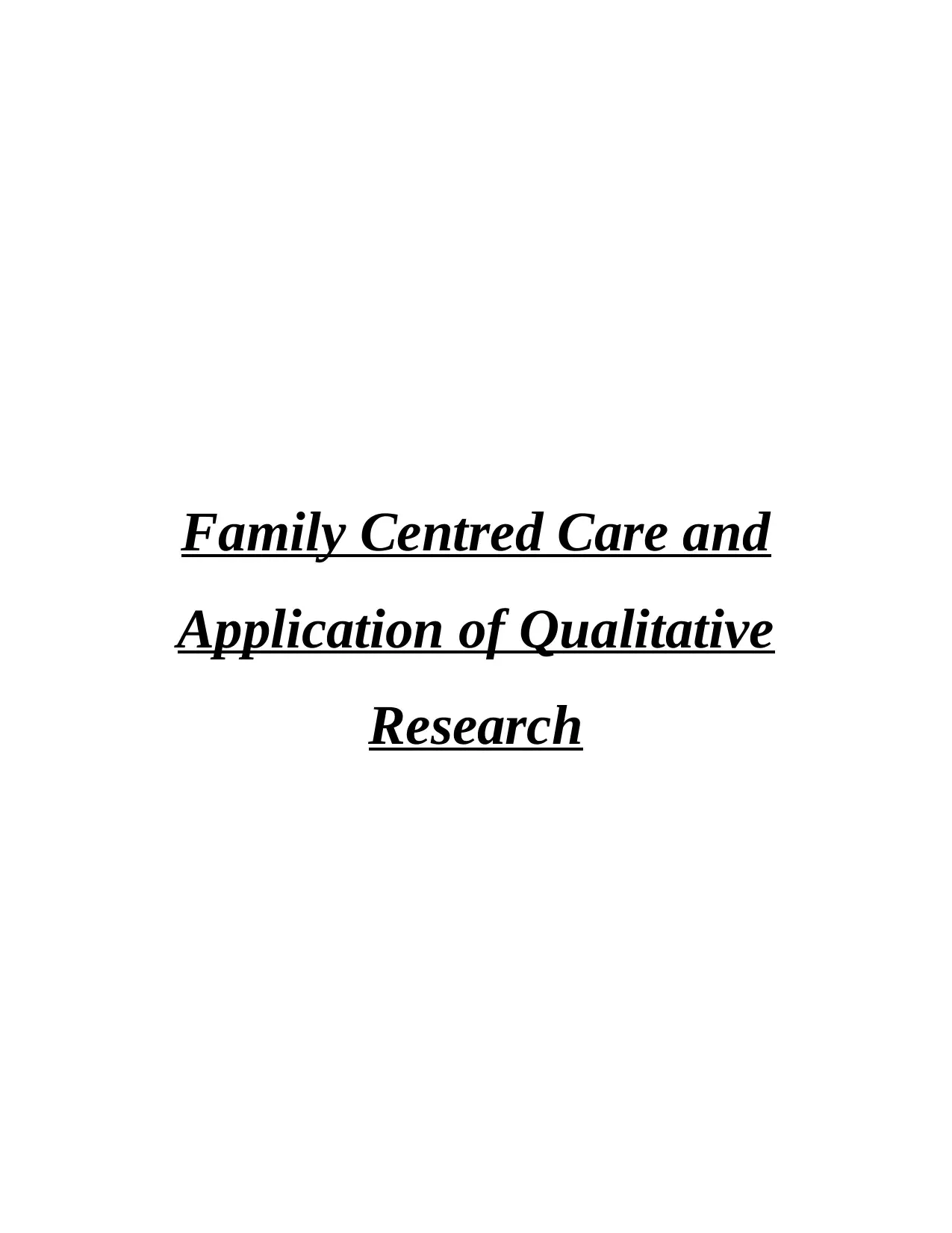
Family Centred Care and
Application of Qualitative
Research
Application of Qualitative
Research
Paraphrase This Document
Need a fresh take? Get an instant paraphrase of this document with our AI Paraphraser
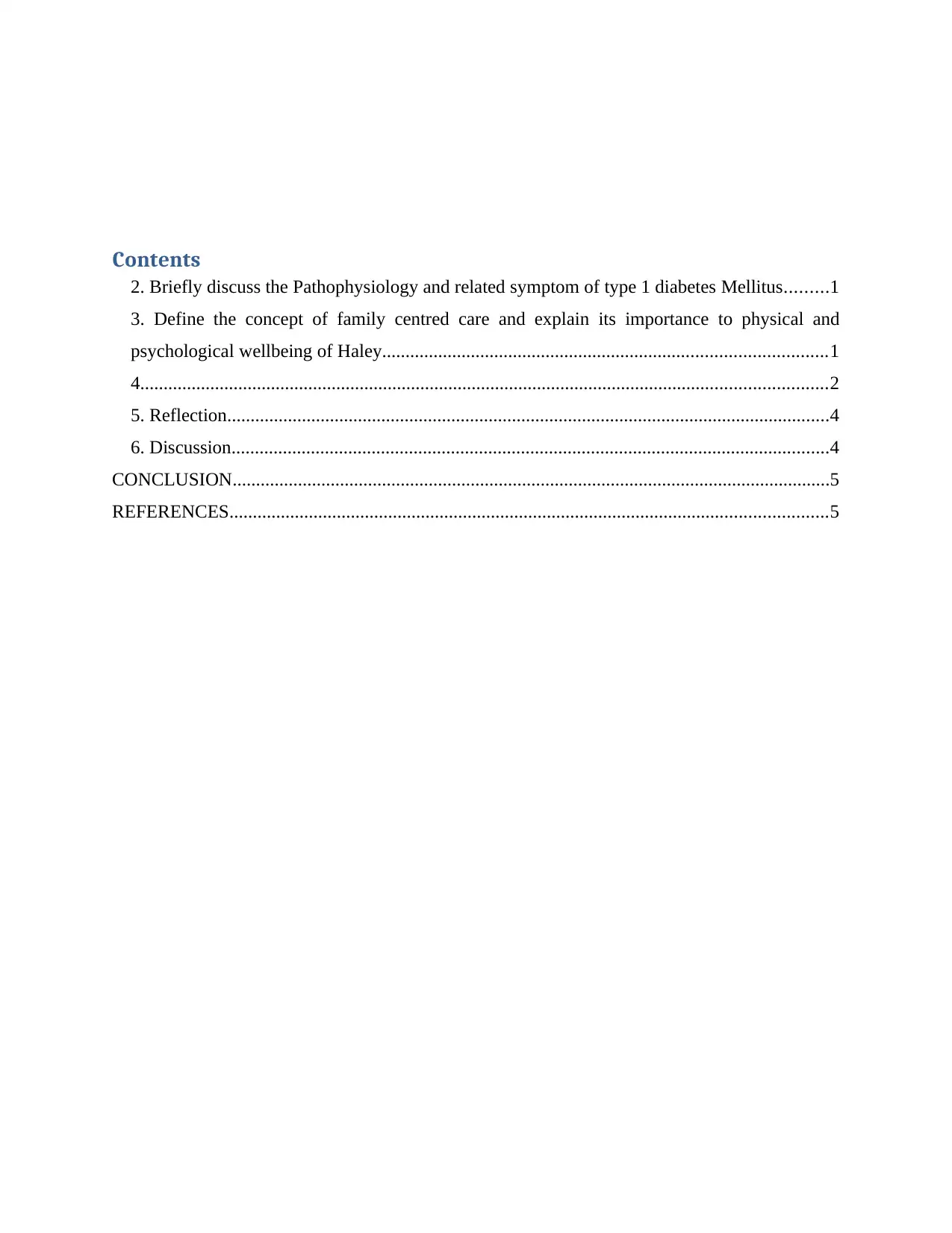
Contents
2. Briefly discuss the Pathophysiology and related symptom of type 1 diabetes Mellitus.........1
3. Define the concept of family centred care and explain its importance to physical and
psychological wellbeing of Haley...............................................................................................1
4...................................................................................................................................................2
5. Reflection.................................................................................................................................4
6. Discussion................................................................................................................................4
CONCLUSION................................................................................................................................5
REFERENCES................................................................................................................................5
2. Briefly discuss the Pathophysiology and related symptom of type 1 diabetes Mellitus.........1
3. Define the concept of family centred care and explain its importance to physical and
psychological wellbeing of Haley...............................................................................................1
4...................................................................................................................................................2
5. Reflection.................................................................................................................................4
6. Discussion................................................................................................................................4
CONCLUSION................................................................................................................................5
REFERENCES................................................................................................................................5

⊘ This is a preview!⊘
Do you want full access?
Subscribe today to unlock all pages.

Trusted by 1+ million students worldwide
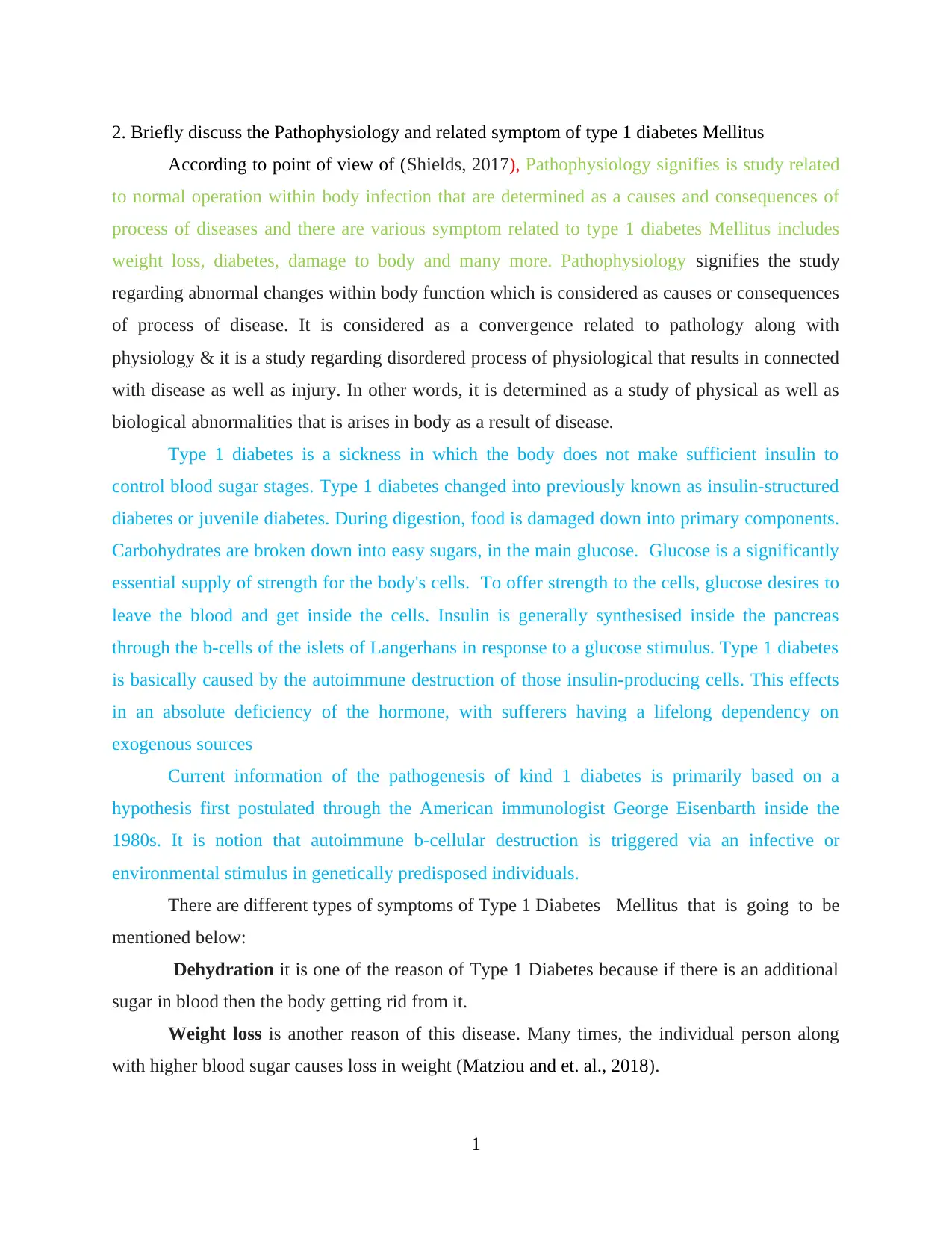
2. Briefly discuss the Pathophysiology and related symptom of type 1 diabetes Mellitus
According to point of view of (Shields, 2017), Pathophysiology signifies is study related
to normal operation within body infection that are determined as a causes and consequences of
process of diseases and there are various symptom related to type 1 diabetes Mellitus includes
weight loss, diabetes, damage to body and many more. Pathophysiology signifies the study
regarding abnormal changes within body function which is considered as causes or consequences
of process of disease. It is considered as a convergence related to pathology along with
physiology & it is a study regarding disordered process of physiological that results in connected
with disease as well as injury. In other words, it is determined as a study of physical as well as
biological abnormalities that is arises in body as a result of disease.
Type 1 diabetes is a sickness in which the body does not make sufficient insulin to
control blood sugar stages. Type 1 diabetes changed into previously known as insulin-structured
diabetes or juvenile diabetes. During digestion, food is damaged down into primary components.
Carbohydrates are broken down into easy sugars, in the main glucose. Glucose is a significantly
essential supply of strength for the body's cells. To offer strength to the cells, glucose desires to
leave the blood and get inside the cells. Insulin is generally synthesised inside the pancreas
through the b-cells of the islets of Langerhans in response to a glucose stimulus. Type 1 diabetes
is basically caused by the autoimmune destruction of those insulin-producing cells. This effects
in an absolute deficiency of the hormone, with sufferers having a lifelong dependency on
exogenous sources
Current information of the pathogenesis of kind 1 diabetes is primarily based on a
hypothesis first postulated through the American immunologist George Eisenbarth inside the
1980s. It is notion that autoimmune b-cellular destruction is triggered via an infective or
environmental stimulus in genetically predisposed individuals.
There are different types of symptoms of Type 1 Diabetes Mellitus that is going to be
mentioned below:
Dehydration it is one of the reason of Type 1 Diabetes because if there is an additional
sugar in blood then the body getting rid from it.
Weight loss is another reason of this disease. Many times, the individual person along
with higher blood sugar causes loss in weight (Matziou and et. al., 2018).
1
According to point of view of (Shields, 2017), Pathophysiology signifies is study related
to normal operation within body infection that are determined as a causes and consequences of
process of diseases and there are various symptom related to type 1 diabetes Mellitus includes
weight loss, diabetes, damage to body and many more. Pathophysiology signifies the study
regarding abnormal changes within body function which is considered as causes or consequences
of process of disease. It is considered as a convergence related to pathology along with
physiology & it is a study regarding disordered process of physiological that results in connected
with disease as well as injury. In other words, it is determined as a study of physical as well as
biological abnormalities that is arises in body as a result of disease.
Type 1 diabetes is a sickness in which the body does not make sufficient insulin to
control blood sugar stages. Type 1 diabetes changed into previously known as insulin-structured
diabetes or juvenile diabetes. During digestion, food is damaged down into primary components.
Carbohydrates are broken down into easy sugars, in the main glucose. Glucose is a significantly
essential supply of strength for the body's cells. To offer strength to the cells, glucose desires to
leave the blood and get inside the cells. Insulin is generally synthesised inside the pancreas
through the b-cells of the islets of Langerhans in response to a glucose stimulus. Type 1 diabetes
is basically caused by the autoimmune destruction of those insulin-producing cells. This effects
in an absolute deficiency of the hormone, with sufferers having a lifelong dependency on
exogenous sources
Current information of the pathogenesis of kind 1 diabetes is primarily based on a
hypothesis first postulated through the American immunologist George Eisenbarth inside the
1980s. It is notion that autoimmune b-cellular destruction is triggered via an infective or
environmental stimulus in genetically predisposed individuals.
There are different types of symptoms of Type 1 Diabetes Mellitus that is going to be
mentioned below:
Dehydration it is one of the reason of Type 1 Diabetes because if there is an additional
sugar in blood then the body getting rid from it.
Weight loss is another reason of this disease. Many times, the individual person along
with higher blood sugar causes loss in weight (Matziou and et. al., 2018).
1
Paraphrase This Document
Need a fresh take? Get an instant paraphrase of this document with our AI Paraphraser
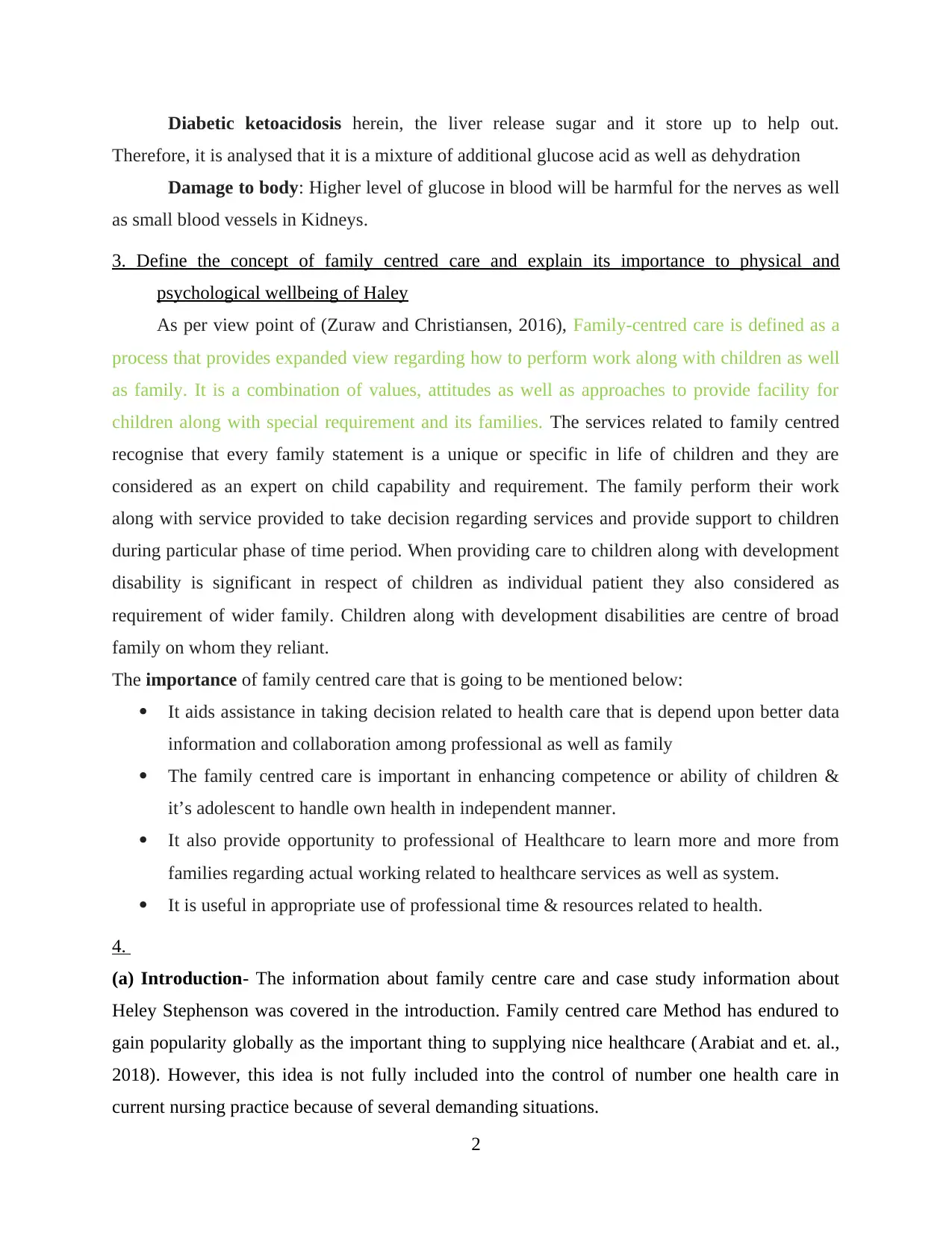
Diabetic ketoacidosis herein, the liver release sugar and it store up to help out.
Therefore, it is analysed that it is a mixture of additional glucose acid as well as dehydration
Damage to body: Higher level of glucose in blood will be harmful for the nerves as well
as small blood vessels in Kidneys.
3. Define the concept of family centred care and explain its importance to physical and
psychological wellbeing of Haley
As per view point of (Zuraw and Christiansen, 2016), Family-centred care is defined as a
process that provides expanded view regarding how to perform work along with children as well
as family. It is a combination of values, attitudes as well as approaches to provide facility for
children along with special requirement and its families. The services related to family centred
recognise that every family statement is a unique or specific in life of children and they are
considered as an expert on child capability and requirement. The family perform their work
along with service provided to take decision regarding services and provide support to children
during particular phase of time period. When providing care to children along with development
disability is significant in respect of children as individual patient they also considered as
requirement of wider family. Children along with development disabilities are centre of broad
family on whom they reliant.
The importance of family centred care that is going to be mentioned below:
It aids assistance in taking decision related to health care that is depend upon better data
information and collaboration among professional as well as family
The family centred care is important in enhancing competence or ability of children &
it’s adolescent to handle own health in independent manner.
It also provide opportunity to professional of Healthcare to learn more and more from
families regarding actual working related to healthcare services as well as system.
It is useful in appropriate use of professional time & resources related to health.
4.
(a) Introduction- The information about family centre care and case study information about
Heley Stephenson was covered in the introduction. Family centred care Method has endured to
gain popularity globally as the important thing to supplying nice healthcare (Arabiat and et. al.,
2018). However, this idea is not fully included into the control of number one health care in
current nursing practice because of several demanding situations.
2
Therefore, it is analysed that it is a mixture of additional glucose acid as well as dehydration
Damage to body: Higher level of glucose in blood will be harmful for the nerves as well
as small blood vessels in Kidneys.
3. Define the concept of family centred care and explain its importance to physical and
psychological wellbeing of Haley
As per view point of (Zuraw and Christiansen, 2016), Family-centred care is defined as a
process that provides expanded view regarding how to perform work along with children as well
as family. It is a combination of values, attitudes as well as approaches to provide facility for
children along with special requirement and its families. The services related to family centred
recognise that every family statement is a unique or specific in life of children and they are
considered as an expert on child capability and requirement. The family perform their work
along with service provided to take decision regarding services and provide support to children
during particular phase of time period. When providing care to children along with development
disability is significant in respect of children as individual patient they also considered as
requirement of wider family. Children along with development disabilities are centre of broad
family on whom they reliant.
The importance of family centred care that is going to be mentioned below:
It aids assistance in taking decision related to health care that is depend upon better data
information and collaboration among professional as well as family
The family centred care is important in enhancing competence or ability of children &
it’s adolescent to handle own health in independent manner.
It also provide opportunity to professional of Healthcare to learn more and more from
families regarding actual working related to healthcare services as well as system.
It is useful in appropriate use of professional time & resources related to health.
4.
(a) Introduction- The information about family centre care and case study information about
Heley Stephenson was covered in the introduction. Family centred care Method has endured to
gain popularity globally as the important thing to supplying nice healthcare (Arabiat and et. al.,
2018). However, this idea is not fully included into the control of number one health care in
current nursing practice because of several demanding situations.
2
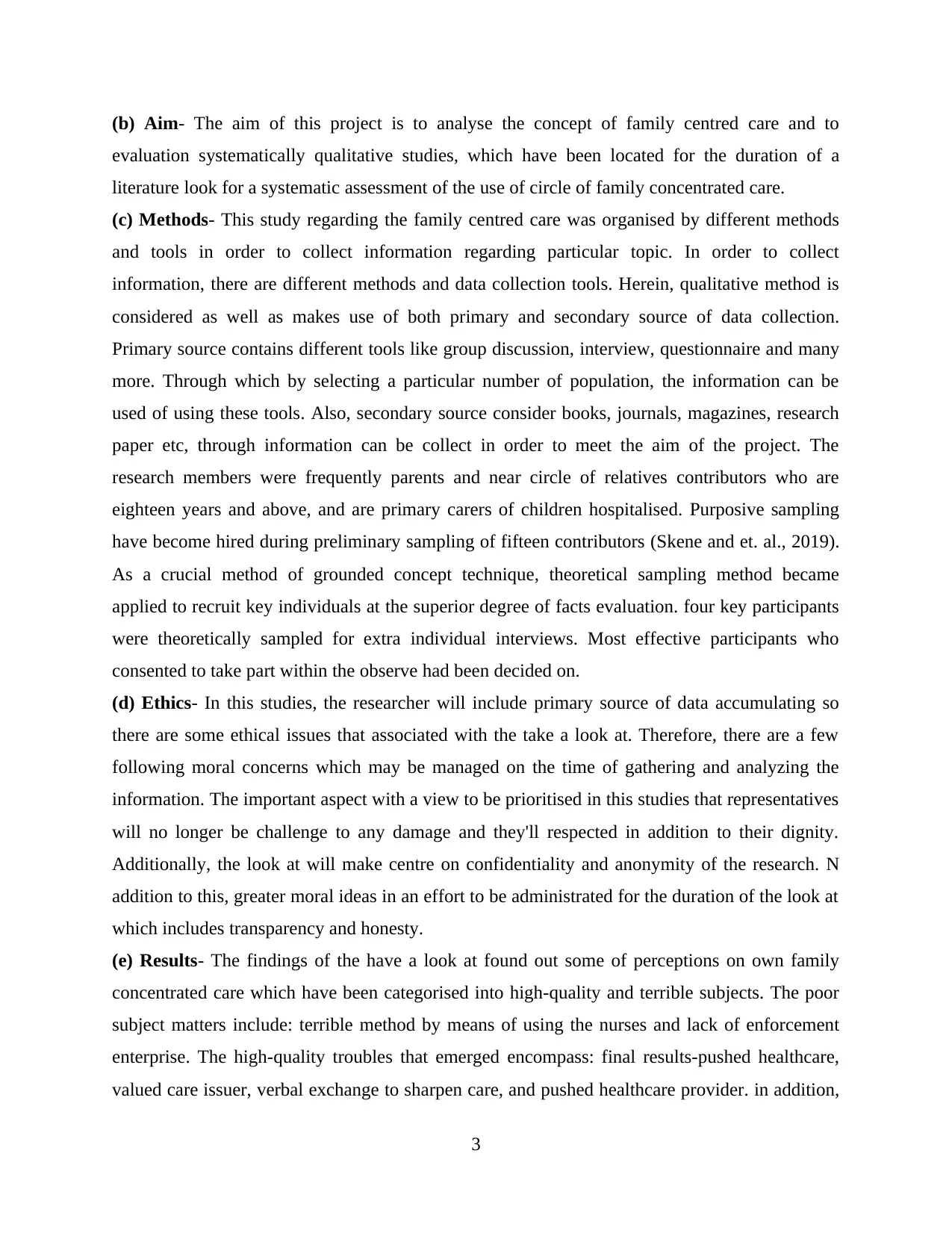
(b) Aim- The aim of this project is to analyse the concept of family centred care and to
evaluation systematically qualitative studies, which have been located for the duration of a
literature look for a systematic assessment of the use of circle of family concentrated care.
(c) Methods- This study regarding the family centred care was organised by different methods
and tools in order to collect information regarding particular topic. In order to collect
information, there are different methods and data collection tools. Herein, qualitative method is
considered as well as makes use of both primary and secondary source of data collection.
Primary source contains different tools like group discussion, interview, questionnaire and many
more. Through which by selecting a particular number of population, the information can be
used of using these tools. Also, secondary source consider books, journals, magazines, research
paper etc, through information can be collect in order to meet the aim of the project. The
research members were frequently parents and near circle of relatives contributors who are
eighteen years and above, and are primary carers of children hospitalised. Purposive sampling
have become hired during preliminary sampling of fifteen contributors (Skene and et. al., 2019).
As a crucial method of grounded concept technique, theoretical sampling method became
applied to recruit key individuals at the superior degree of facts evaluation. four key participants
were theoretically sampled for extra individual interviews. Most effective participants who
consented to take part within the observe had been decided on.
(d) Ethics- In this studies, the researcher will include primary source of data accumulating so
there are some ethical issues that associated with the take a look at. Therefore, there are a few
following moral concerns which may be managed on the time of gathering and analyzing the
information. The important aspect with a view to be prioritised in this studies that representatives
will no longer be challenge to any damage and they'll respected in addition to their dignity.
Additionally, the look at will make centre on confidentiality and anonymity of the research. N
addition to this, greater moral ideas in an effort to be administrated for the duration of the look at
which includes transparency and honesty.
(e) Results- The findings of the have a look at found out some of perceptions on own family
concentrated care which have been categorised into high-quality and terrible subjects. The poor
subject matters include: terrible method by means of using the nurses and lack of enforcement
enterprise. The high-quality troubles that emerged encompass: final results-pushed healthcare,
valued care issuer, verbal exchange to sharpen care, and pushed healthcare provider. in addition,
3
evaluation systematically qualitative studies, which have been located for the duration of a
literature look for a systematic assessment of the use of circle of family concentrated care.
(c) Methods- This study regarding the family centred care was organised by different methods
and tools in order to collect information regarding particular topic. In order to collect
information, there are different methods and data collection tools. Herein, qualitative method is
considered as well as makes use of both primary and secondary source of data collection.
Primary source contains different tools like group discussion, interview, questionnaire and many
more. Through which by selecting a particular number of population, the information can be
used of using these tools. Also, secondary source consider books, journals, magazines, research
paper etc, through information can be collect in order to meet the aim of the project. The
research members were frequently parents and near circle of relatives contributors who are
eighteen years and above, and are primary carers of children hospitalised. Purposive sampling
have become hired during preliminary sampling of fifteen contributors (Skene and et. al., 2019).
As a crucial method of grounded concept technique, theoretical sampling method became
applied to recruit key individuals at the superior degree of facts evaluation. four key participants
were theoretically sampled for extra individual interviews. Most effective participants who
consented to take part within the observe had been decided on.
(d) Ethics- In this studies, the researcher will include primary source of data accumulating so
there are some ethical issues that associated with the take a look at. Therefore, there are a few
following moral concerns which may be managed on the time of gathering and analyzing the
information. The important aspect with a view to be prioritised in this studies that representatives
will no longer be challenge to any damage and they'll respected in addition to their dignity.
Additionally, the look at will make centre on confidentiality and anonymity of the research. N
addition to this, greater moral ideas in an effort to be administrated for the duration of the look at
which includes transparency and honesty.
(e) Results- The findings of the have a look at found out some of perceptions on own family
concentrated care which have been categorised into high-quality and terrible subjects. The poor
subject matters include: terrible method by means of using the nurses and lack of enforcement
enterprise. The high-quality troubles that emerged encompass: final results-pushed healthcare,
valued care issuer, verbal exchange to sharpen care, and pushed healthcare provider. in addition,
3
⊘ This is a preview!⊘
Do you want full access?
Subscribe today to unlock all pages.

Trusted by 1+ million students worldwide
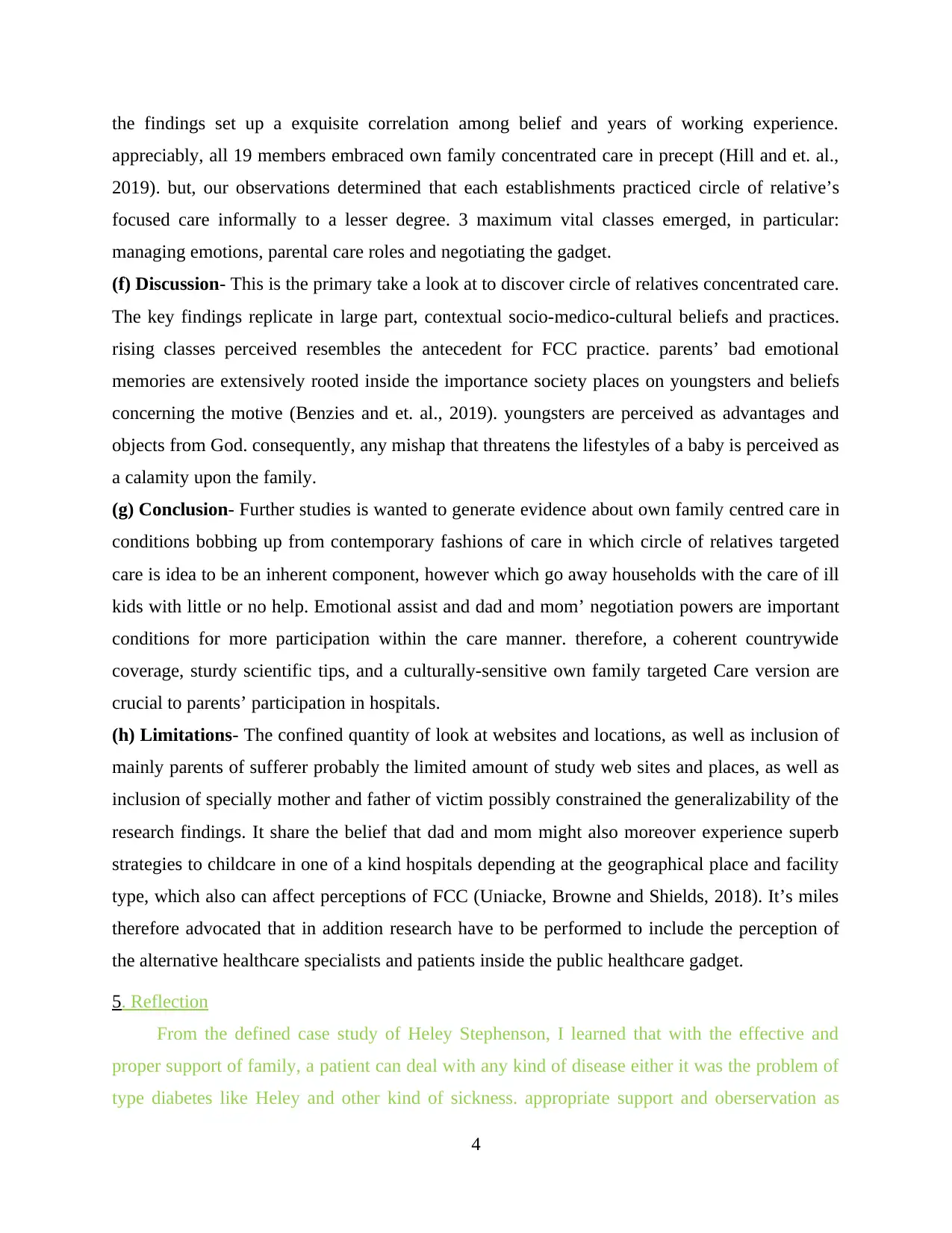
the findings set up a exquisite correlation among belief and years of working experience.
appreciably, all 19 members embraced own family concentrated care in precept (Hill and et. al.,
2019). but, our observations determined that each establishments practiced circle of relative’s
focused care informally to a lesser degree. 3 maximum vital classes emerged, in particular:
managing emotions, parental care roles and negotiating the gadget.
(f) Discussion- This is the primary take a look at to discover circle of relatives concentrated care.
The key findings replicate in large part, contextual socio-medico-cultural beliefs and practices.
rising classes perceived resembles the antecedent for FCC practice. parents’ bad emotional
memories are extensively rooted inside the importance society places on youngsters and beliefs
concerning the motive (Benzies and et. al., 2019). youngsters are perceived as advantages and
objects from God. consequently, any mishap that threatens the lifestyles of a baby is perceived as
a calamity upon the family.
(g) Conclusion- Further studies is wanted to generate evidence about own family centred care in
conditions bobbing up from contemporary fashions of care in which circle of relatives targeted
care is idea to be an inherent component, however which go away households with the care of ill
kids with little or no help. Emotional assist and dad and mom’ negotiation powers are important
conditions for more participation within the care manner. therefore, a coherent countrywide
coverage, sturdy scientific tips, and a culturally-sensitive own family targeted Care version are
crucial to parents’ participation in hospitals.
(h) Limitations- The confined quantity of look at websites and locations, as well as inclusion of
mainly parents of sufferer probably the limited amount of study web sites and places, as well as
inclusion of specially mother and father of victim possibly constrained the generalizability of the
research findings. It share the belief that dad and mom might also moreover experience superb
strategies to childcare in one of a kind hospitals depending at the geographical place and facility
type, which also can affect perceptions of FCC (Uniacke, Browne and Shields, 2018). It’s miles
therefore advocated that in addition research have to be performed to include the perception of
the alternative healthcare specialists and patients inside the public healthcare gadget.
5. Reflection
From the defined case study of Heley Stephenson, I learned that with the effective and
proper support of family, a patient can deal with any kind of disease either it was the problem of
type diabetes like Heley and other kind of sickness. appropriate support and oberservation as
4
appreciably, all 19 members embraced own family concentrated care in precept (Hill and et. al.,
2019). but, our observations determined that each establishments practiced circle of relative’s
focused care informally to a lesser degree. 3 maximum vital classes emerged, in particular:
managing emotions, parental care roles and negotiating the gadget.
(f) Discussion- This is the primary take a look at to discover circle of relatives concentrated care.
The key findings replicate in large part, contextual socio-medico-cultural beliefs and practices.
rising classes perceived resembles the antecedent for FCC practice. parents’ bad emotional
memories are extensively rooted inside the importance society places on youngsters and beliefs
concerning the motive (Benzies and et. al., 2019). youngsters are perceived as advantages and
objects from God. consequently, any mishap that threatens the lifestyles of a baby is perceived as
a calamity upon the family.
(g) Conclusion- Further studies is wanted to generate evidence about own family centred care in
conditions bobbing up from contemporary fashions of care in which circle of relatives targeted
care is idea to be an inherent component, however which go away households with the care of ill
kids with little or no help. Emotional assist and dad and mom’ negotiation powers are important
conditions for more participation within the care manner. therefore, a coherent countrywide
coverage, sturdy scientific tips, and a culturally-sensitive own family targeted Care version are
crucial to parents’ participation in hospitals.
(h) Limitations- The confined quantity of look at websites and locations, as well as inclusion of
mainly parents of sufferer probably the limited amount of study web sites and places, as well as
inclusion of specially mother and father of victim possibly constrained the generalizability of the
research findings. It share the belief that dad and mom might also moreover experience superb
strategies to childcare in one of a kind hospitals depending at the geographical place and facility
type, which also can affect perceptions of FCC (Uniacke, Browne and Shields, 2018). It’s miles
therefore advocated that in addition research have to be performed to include the perception of
the alternative healthcare specialists and patients inside the public healthcare gadget.
5. Reflection
From the defined case study of Heley Stephenson, I learned that with the effective and
proper support of family, a patient can deal with any kind of disease either it was the problem of
type diabetes like Heley and other kind of sickness. appropriate support and oberservation as
4
Paraphrase This Document
Need a fresh take? Get an instant paraphrase of this document with our AI Paraphraser
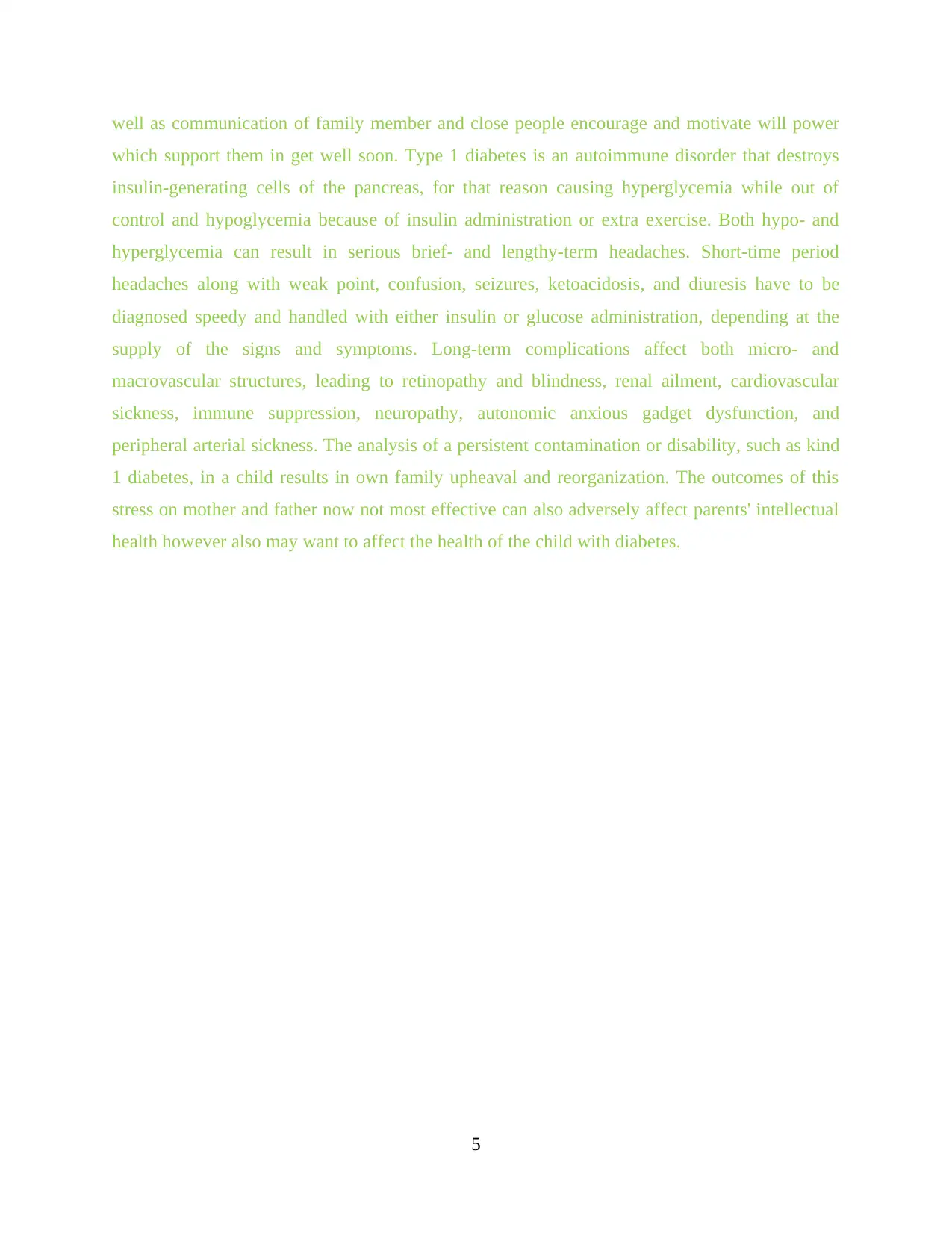
well as communication of family member and close people encourage and motivate will power
which support them in get well soon. Type 1 diabetes is an autoimmune disorder that destroys
insulin-generating cells of the pancreas, for that reason causing hyperglycemia while out of
control and hypoglycemia because of insulin administration or extra exercise. Both hypo- and
hyperglycemia can result in serious brief- and lengthy-term headaches. Short-time period
headaches along with weak point, confusion, seizures, ketoacidosis, and diuresis have to be
diagnosed speedy and handled with either insulin or glucose administration, depending at the
supply of the signs and symptoms. Long-term complications affect both micro- and
macrovascular structures, leading to retinopathy and blindness, renal ailment, cardiovascular
sickness, immune suppression, neuropathy, autonomic anxious gadget dysfunction, and
peripheral arterial sickness. The analysis of a persistent contamination or disability, such as kind
1 diabetes, in a child results in own family upheaval and reorganization. The outcomes of this
stress on mother and father now not most effective can also adversely affect parents' intellectual
health however also may want to affect the health of the child with diabetes.
5
which support them in get well soon. Type 1 diabetes is an autoimmune disorder that destroys
insulin-generating cells of the pancreas, for that reason causing hyperglycemia while out of
control and hypoglycemia because of insulin administration or extra exercise. Both hypo- and
hyperglycemia can result in serious brief- and lengthy-term headaches. Short-time period
headaches along with weak point, confusion, seizures, ketoacidosis, and diuresis have to be
diagnosed speedy and handled with either insulin or glucose administration, depending at the
supply of the signs and symptoms. Long-term complications affect both micro- and
macrovascular structures, leading to retinopathy and blindness, renal ailment, cardiovascular
sickness, immune suppression, neuropathy, autonomic anxious gadget dysfunction, and
peripheral arterial sickness. The analysis of a persistent contamination or disability, such as kind
1 diabetes, in a child results in own family upheaval and reorganization. The outcomes of this
stress on mother and father now not most effective can also adversely affect parents' intellectual
health however also may want to affect the health of the child with diabetes.
5
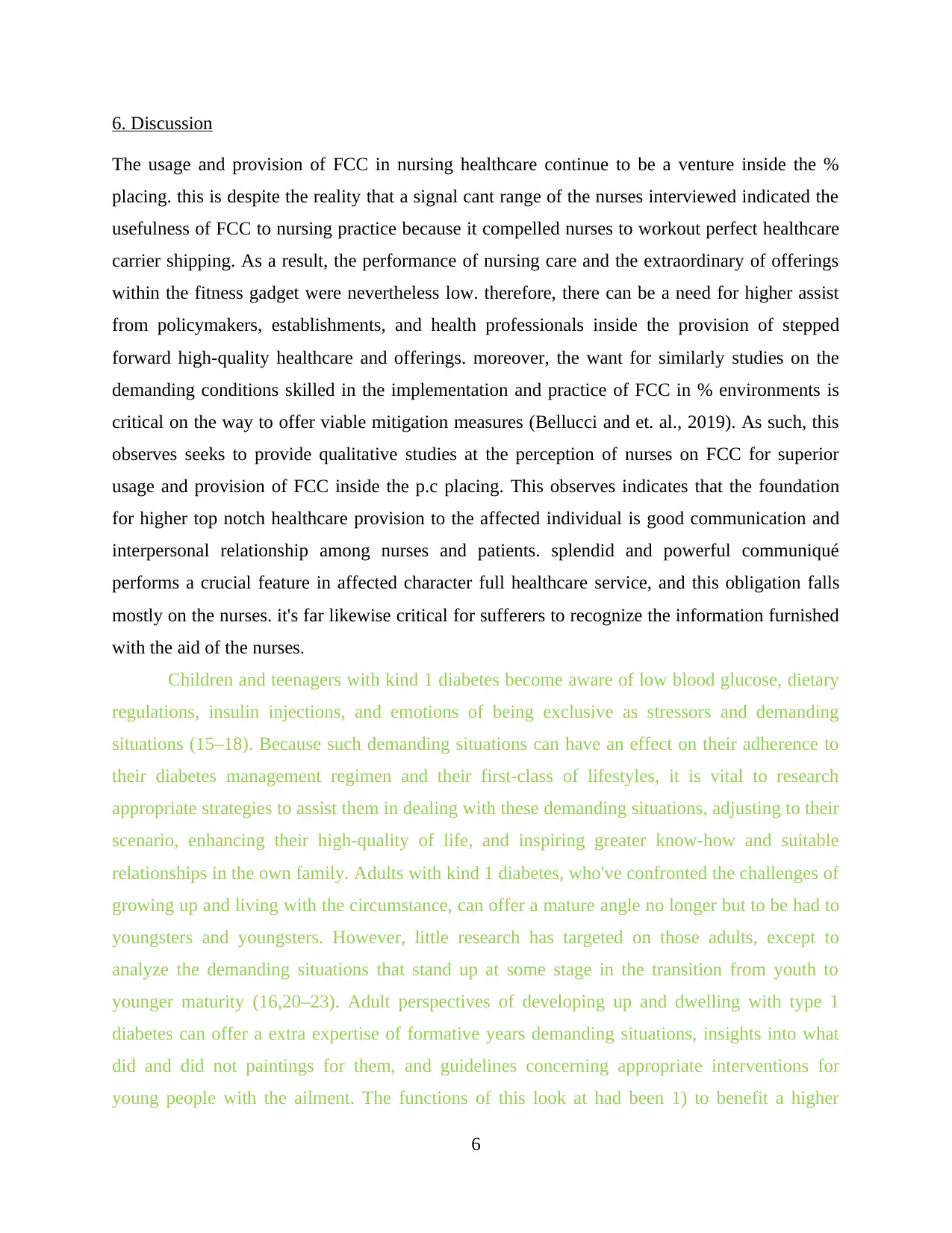
6. Discussion
The usage and provision of FCC in nursing healthcare continue to be a venture inside the %
placing. this is despite the reality that a signal cant range of the nurses interviewed indicated the
usefulness of FCC to nursing practice because it compelled nurses to workout perfect healthcare
carrier shipping. As a result, the performance of nursing care and the extraordinary of offerings
within the fitness gadget were nevertheless low. therefore, there can be a need for higher assist
from policymakers, establishments, and health professionals inside the provision of stepped
forward high-quality healthcare and offerings. moreover, the want for similarly studies on the
demanding conditions skilled in the implementation and practice of FCC in % environments is
critical on the way to offer viable mitigation measures (Bellucci and et. al., 2019). As such, this
observes seeks to provide qualitative studies at the perception of nurses on FCC for superior
usage and provision of FCC inside the p.c placing. This observes indicates that the foundation
for higher top notch healthcare provision to the affected individual is good communication and
interpersonal relationship among nurses and patients. splendid and powerful communiqué
performs a crucial feature in affected character full healthcare service, and this obligation falls
mostly on the nurses. it's far likewise critical for sufferers to recognize the information furnished
with the aid of the nurses.
Children and teenagers with kind 1 diabetes become aware of low blood glucose, dietary
regulations, insulin injections, and emotions of being exclusive as stressors and demanding
situations (15–18). Because such demanding situations can have an effect on their adherence to
their diabetes management regimen and their first-class of lifestyles, it is vital to research
appropriate strategies to assist them in dealing with these demanding situations, adjusting to their
scenario, enhancing their high-quality of life, and inspiring greater know-how and suitable
relationships in the own family. Adults with kind 1 diabetes, who've confronted the challenges of
growing up and living with the circumstance, can offer a mature angle no longer but to be had to
youngsters and youngsters. However, little research has targeted on those adults, except to
analyze the demanding situations that stand up at some stage in the transition from youth to
younger maturity (16,20–23). Adult perspectives of developing up and dwelling with type 1
diabetes can offer a extra expertise of formative years demanding situations, insights into what
did and did not paintings for them, and guidelines concerning appropriate interventions for
young people with the ailment. The functions of this look at had been 1) to benefit a higher
6
The usage and provision of FCC in nursing healthcare continue to be a venture inside the %
placing. this is despite the reality that a signal cant range of the nurses interviewed indicated the
usefulness of FCC to nursing practice because it compelled nurses to workout perfect healthcare
carrier shipping. As a result, the performance of nursing care and the extraordinary of offerings
within the fitness gadget were nevertheless low. therefore, there can be a need for higher assist
from policymakers, establishments, and health professionals inside the provision of stepped
forward high-quality healthcare and offerings. moreover, the want for similarly studies on the
demanding conditions skilled in the implementation and practice of FCC in % environments is
critical on the way to offer viable mitigation measures (Bellucci and et. al., 2019). As such, this
observes seeks to provide qualitative studies at the perception of nurses on FCC for superior
usage and provision of FCC inside the p.c placing. This observes indicates that the foundation
for higher top notch healthcare provision to the affected individual is good communication and
interpersonal relationship among nurses and patients. splendid and powerful communiqué
performs a crucial feature in affected character full healthcare service, and this obligation falls
mostly on the nurses. it's far likewise critical for sufferers to recognize the information furnished
with the aid of the nurses.
Children and teenagers with kind 1 diabetes become aware of low blood glucose, dietary
regulations, insulin injections, and emotions of being exclusive as stressors and demanding
situations (15–18). Because such demanding situations can have an effect on their adherence to
their diabetes management regimen and their first-class of lifestyles, it is vital to research
appropriate strategies to assist them in dealing with these demanding situations, adjusting to their
scenario, enhancing their high-quality of life, and inspiring greater know-how and suitable
relationships in the own family. Adults with kind 1 diabetes, who've confronted the challenges of
growing up and living with the circumstance, can offer a mature angle no longer but to be had to
youngsters and youngsters. However, little research has targeted on those adults, except to
analyze the demanding situations that stand up at some stage in the transition from youth to
younger maturity (16,20–23). Adult perspectives of developing up and dwelling with type 1
diabetes can offer a extra expertise of formative years demanding situations, insights into what
did and did not paintings for them, and guidelines concerning appropriate interventions for
young people with the ailment. The functions of this look at had been 1) to benefit a higher
6
⊘ This is a preview!⊘
Do you want full access?
Subscribe today to unlock all pages.

Trusted by 1+ million students worldwide
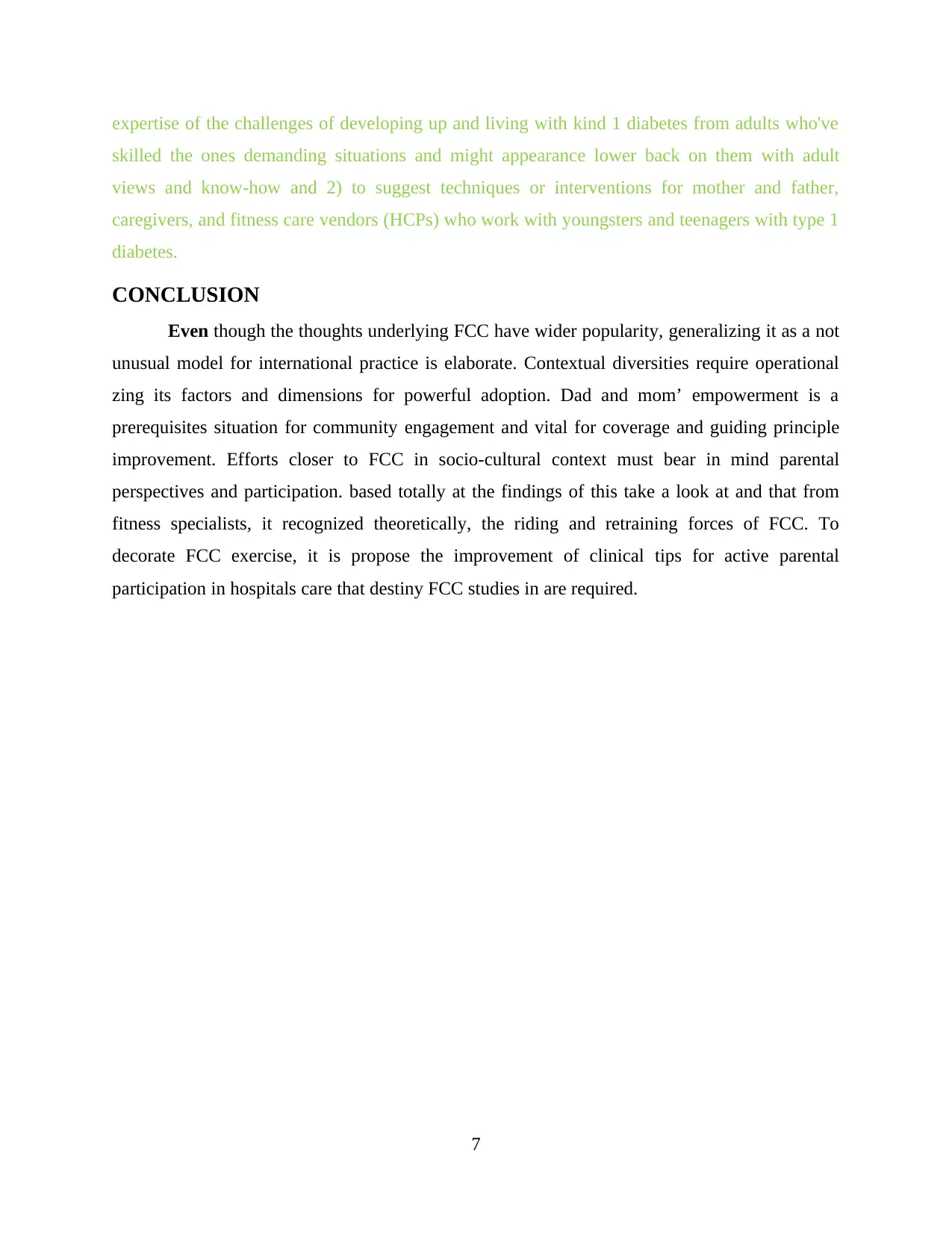
expertise of the challenges of developing up and living with kind 1 diabetes from adults who've
skilled the ones demanding situations and might appearance lower back on them with adult
views and know-how and 2) to suggest techniques or interventions for mother and father,
caregivers, and fitness care vendors (HCPs) who work with youngsters and teenagers with type 1
diabetes.
CONCLUSION
Even though the thoughts underlying FCC have wider popularity, generalizing it as a not
unusual model for international practice is elaborate. Contextual diversities require operational
zing its factors and dimensions for powerful adoption. Dad and mom’ empowerment is a
prerequisites situation for community engagement and vital for coverage and guiding principle
improvement. Efforts closer to FCC in socio-cultural context must bear in mind parental
perspectives and participation. based totally at the findings of this take a look at and that from
fitness specialists, it recognized theoretically, the riding and retraining forces of FCC. To
decorate FCC exercise, it is propose the improvement of clinical tips for active parental
participation in hospitals care that destiny FCC studies in are required.
7
skilled the ones demanding situations and might appearance lower back on them with adult
views and know-how and 2) to suggest techniques or interventions for mother and father,
caregivers, and fitness care vendors (HCPs) who work with youngsters and teenagers with type 1
diabetes.
CONCLUSION
Even though the thoughts underlying FCC have wider popularity, generalizing it as a not
unusual model for international practice is elaborate. Contextual diversities require operational
zing its factors and dimensions for powerful adoption. Dad and mom’ empowerment is a
prerequisites situation for community engagement and vital for coverage and guiding principle
improvement. Efforts closer to FCC in socio-cultural context must bear in mind parental
perspectives and participation. based totally at the findings of this take a look at and that from
fitness specialists, it recognized theoretically, the riding and retraining forces of FCC. To
decorate FCC exercise, it is propose the improvement of clinical tips for active parental
participation in hospitals care that destiny FCC studies in are required.
7
Paraphrase This Document
Need a fresh take? Get an instant paraphrase of this document with our AI Paraphraser
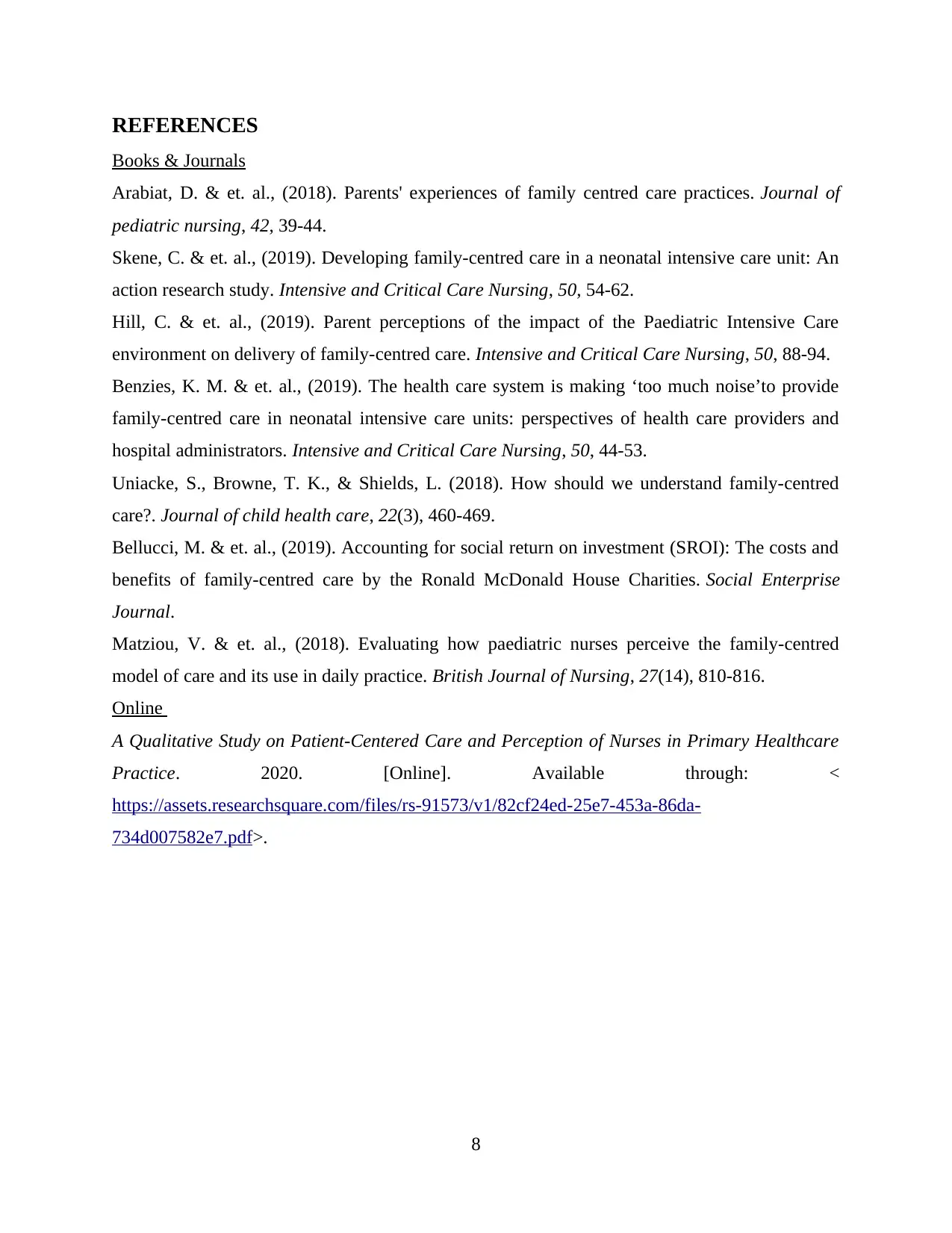
REFERENCES
Books & Journals
Arabiat, D. & et. al., (2018). Parents' experiences of family centred care practices. Journal of
pediatric nursing, 42, 39-44.
Skene, C. & et. al., (2019). Developing family-centred care in a neonatal intensive care unit: An
action research study. Intensive and Critical Care Nursing, 50, 54-62.
Hill, C. & et. al., (2019). Parent perceptions of the impact of the Paediatric Intensive Care
environment on delivery of family-centred care. Intensive and Critical Care Nursing, 50, 88-94.
Benzies, K. M. & et. al., (2019). The health care system is making ‘too much noise’to provide
family-centred care in neonatal intensive care units: perspectives of health care providers and
hospital administrators. Intensive and Critical Care Nursing, 50, 44-53.
Uniacke, S., Browne, T. K., & Shields, L. (2018). How should we understand family-centred
care?. Journal of child health care, 22(3), 460-469.
Bellucci, M. & et. al., (2019). Accounting for social return on investment (SROI): The costs and
benefits of family-centred care by the Ronald McDonald House Charities. Social Enterprise
Journal.
Matziou, V. & et. al., (2018). Evaluating how paediatric nurses perceive the family-centred
model of care and its use in daily practice. British Journal of Nursing, 27(14), 810-816.
Online
A Qualitative Study on Patient-Centered Care and Perception of Nurses in Primary Healthcare
Practice. 2020. [Online]. Available through: <
https://assets.researchsquare.com/files/rs-91573/v1/82cf24ed-25e7-453a-86da-
734d007582e7.pdf>.
8
Books & Journals
Arabiat, D. & et. al., (2018). Parents' experiences of family centred care practices. Journal of
pediatric nursing, 42, 39-44.
Skene, C. & et. al., (2019). Developing family-centred care in a neonatal intensive care unit: An
action research study. Intensive and Critical Care Nursing, 50, 54-62.
Hill, C. & et. al., (2019). Parent perceptions of the impact of the Paediatric Intensive Care
environment on delivery of family-centred care. Intensive and Critical Care Nursing, 50, 88-94.
Benzies, K. M. & et. al., (2019). The health care system is making ‘too much noise’to provide
family-centred care in neonatal intensive care units: perspectives of health care providers and
hospital administrators. Intensive and Critical Care Nursing, 50, 44-53.
Uniacke, S., Browne, T. K., & Shields, L. (2018). How should we understand family-centred
care?. Journal of child health care, 22(3), 460-469.
Bellucci, M. & et. al., (2019). Accounting for social return on investment (SROI): The costs and
benefits of family-centred care by the Ronald McDonald House Charities. Social Enterprise
Journal.
Matziou, V. & et. al., (2018). Evaluating how paediatric nurses perceive the family-centred
model of care and its use in daily practice. British Journal of Nursing, 27(14), 810-816.
Online
A Qualitative Study on Patient-Centered Care and Perception of Nurses in Primary Healthcare
Practice. 2020. [Online]. Available through: <
https://assets.researchsquare.com/files/rs-91573/v1/82cf24ed-25e7-453a-86da-
734d007582e7.pdf>.
8
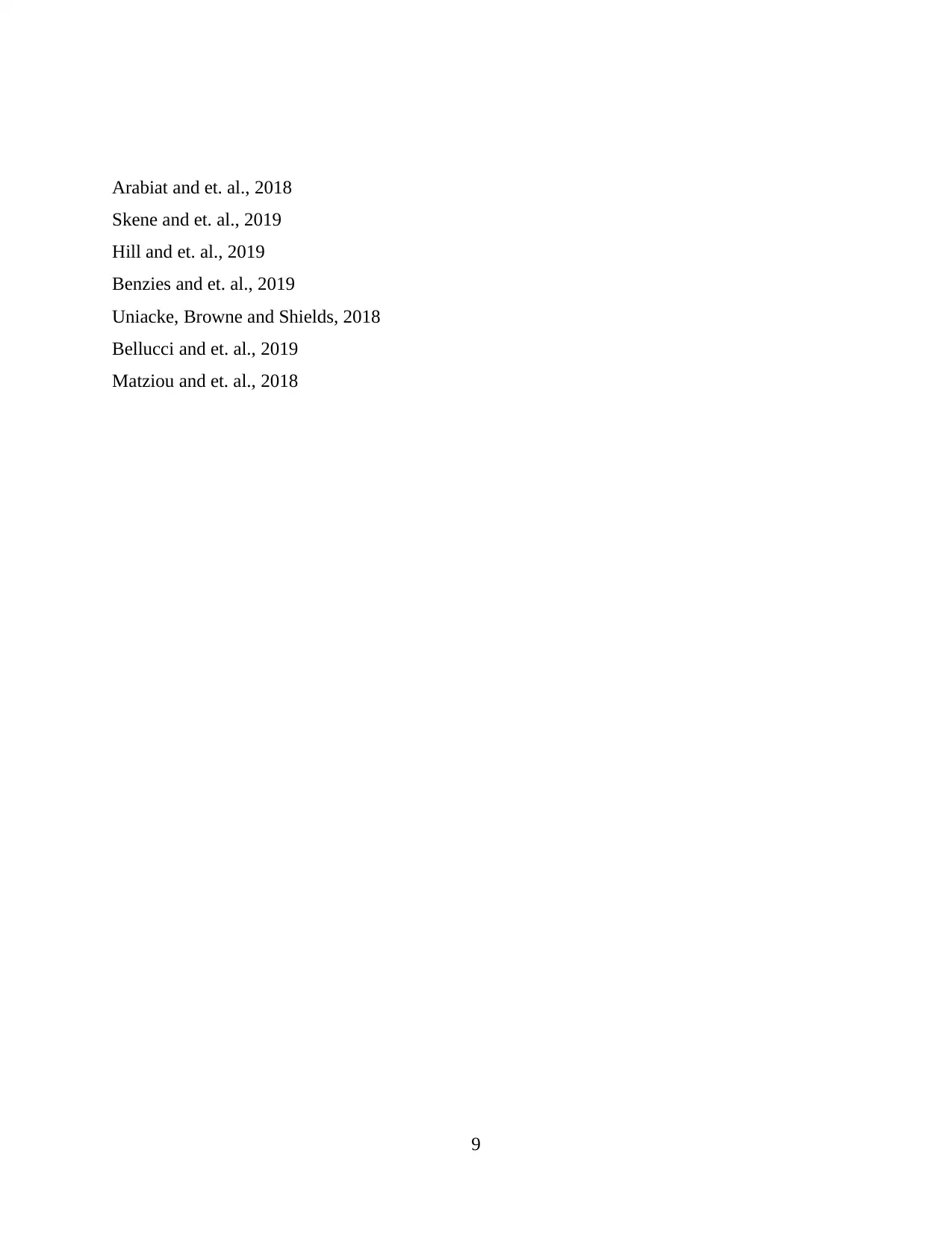
Arabiat and et. al., 2018
Skene and et. al., 2019
Hill and et. al., 2019
Benzies and et. al., 2019
Uniacke, Browne and Shields, 2018
Bellucci and et. al., 2019
Matziou and et. al., 2018
9
Skene and et. al., 2019
Hill and et. al., 2019
Benzies and et. al., 2019
Uniacke, Browne and Shields, 2018
Bellucci and et. al., 2019
Matziou and et. al., 2018
9
⊘ This is a preview!⊘
Do you want full access?
Subscribe today to unlock all pages.

Trusted by 1+ million students worldwide
1 out of 12
Related Documents
Your All-in-One AI-Powered Toolkit for Academic Success.
+13062052269
info@desklib.com
Available 24*7 on WhatsApp / Email
![[object Object]](/_next/static/media/star-bottom.7253800d.svg)
Unlock your academic potential
Copyright © 2020–2026 A2Z Services. All Rights Reserved. Developed and managed by ZUCOL.





